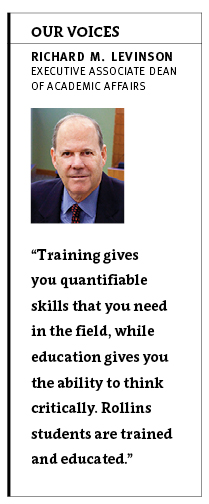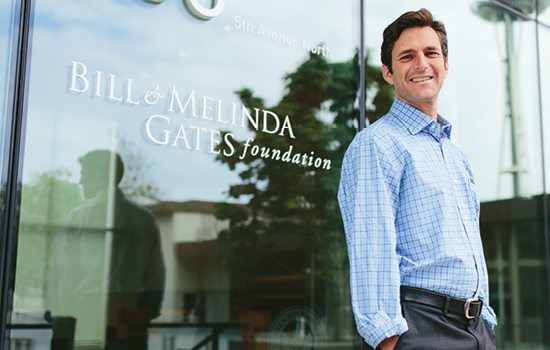Shaping tomorrow's public health leaders
By Martha Mckenzie
 |
||||||
 |
 |
 |
 |
|||
 Passionate students and dedicated professors are committed to making a difference in public health throughout Georgia and around the world.
Passionate students and dedicated professors are committed to making a difference in public health throughout Georgia and around the world.
When alumni reflect on their studies at Rollins, it’s typically with something akin to awe.
 |
Many still find it hard to believe that they were able to attend lectures from the mastermind of the smallpox eradication campaign. Or study health policy under one of the architects of the Affordable Care Act. Or learn from a pioneer in global maternal and child nutrition.
These experiences do not happen by chance.
While research is essential at a leading university, teaching is also highly valued at Rollins. So much so that the all members of the faculty are expected to teach, including those in the dean’s office.
"Rollins students are able to study under and interact with people who are actually doing public health, not just talking about it," says Kathy Miner, associate dean of applied public health.
While instruction by engaged scholars has always been Rollins’curricular foundation, the actual paths open to students have multiplied.
Today Rollins students can select a field of study in one of six departments in the traditional program and three majors in the online Executive MPH. Students can further specialize with one of six certificate programs. They can combine their interests with one of 11 dual degree programs and continue their studies with one of six PhD programs.
In what many consider the crown of the Rollins educational experience, students have unparalleled opportunities for hands-on learning. Through practica, internships, volunteering, and the Rollins Earn and Learn Program, students gain in-the-field experience and work with world-class scientists at leading public health institutions, including the CDC, the Carter Center, the American Cancer Society, CARE, the Task Force for Global Health, the Arthritis Foundation, and state and local health agencies.
"It has often been said, if you want to study public health, you can go anywhere," says Miner. "If you want to do public health, you come to Rollins."
Dual degree helps address HIV/AIDS
 Peter Ehrenkranz 02MD/MPH continues his work on HIV at the Bill & Melinda Gates Foundation. In 2014, almost 37 million people worldwide were living with HIV. Of these, nearly 15 million were receiving antiretroviral therapy.
Peter Ehrenkranz 02MD/MPH continues his work on HIV at the Bill & Melinda Gates Foundation. In 2014, almost 37 million people worldwide were living with HIV. Of these, nearly 15 million were receiving antiretroviral therapy.
The summer after his junior year in college, Peter Ehrenkranz bicycled through Zimbabwe, visiting mission hospitals, as part of a travel study fellowship.
He had been planning to become a doctor, but what he saw in his travels made him want to broaden his focus. So he came to Rollins, where he earned his MD/MPH in 2002.
Ehrenkranz later spent seven years in Africa, first in Liberia with the Clinton Health Access Initiative and then in Swaziland with the CDC.
In both settings he worked to reduce the incidence of HIV/AIDS and tuberculosis. During his five years in Swaziland, the CDC program helped the Ministry of Health increase the proportion of people eligible for HIV treatment who were enrolled in care from 60% to almost 90%.
Today Ehrenkranz is starting a new chapter as senior program officer for HIV treatment with the Bill & Melinda Gates Foundation.
"There are more people who need treatment than there is money to support them. We aim to continually improve on innovative models of service delivery that are both less expensive and of higher quality," he says.
Dual degreesThe MD/MPH is one of 11 dual degrees offered at Rollins. The others are MBA/MPH, MSN/MPH, JD/MPH, JM/MPH, PA/MPH, DPT/MPH, MDiv/MPH, MTS/MPH, PhD/MPH, and MA (Bioethics)/MPH. For the past two years, Rollins has had the most dual degree graduates of any school at Emory, accounting for more than 52% of the graduates in a dual degree program. |
Serving the Cherokee Nation with an EMPH

Physician David Gahn was working as a surveillance coordinator and an OB/GYN with the Cherokee Nation Health Service (CNHS), the largest tribal-operated health care system in the U.S., when he traveled to Afghanistan with the CDC. Gahn and his colleagues worked with Afghan doctors and midwives, who delivered 60 to 80 babies a day to mothers who had no prenatal care.
"I thought, 'How do you fix that?'"Gahn recalls. "I began to see ways to use that experience at Cherokee Nation, but I needed an academic framework to apply what I saw in the clinical setting to public health."
Gahn enrolled in the Executive MPH program—Rollins’ distance learning option for working professionals—and commuted between Afghanistan and Atlanta to take the requisite classes at the start and end of each semester.
"I’m now able to collect and analyze data in the context of the population I work with in Oklahoma and communicate the information so that people can understand and use it," says Gahn. —Pam Auchmutey
EMPH ConcentrationsRollins offers three EMPH concentrations: applied public health informatics, prevention science, and applied epidemiology. |
PhD takes STEPS to prevent birth defects
 |
Sarah Tinker 02MPH, 07PhD finds it easy to go to work each morning.
An epidemiologist with the National Center on Birth Defects and Developmental Disabilities at the CDC, Tinker says, "It’s not hard to be motivated when you’re working to help babies be born healthier."
Tinker is principal investigator for the Georgia Center for the National Birth Defects Prevention Study, which has been going on since 1997. The nationwide study was able to confirm observations that link maternal diabetes and obesity with birth defects, including spina bifida. It also picked up information on the rising use of medications during pregnancy.
These findings served as the foundation for a new study that just started—BD-STEPS (Birth Defects Study to Evaluate Pregnancy exposureS)—for which she is also the PI.
"More and more women are dealing with chronic conditions while they are pregnant," says Tinker. "That’s due partly to women having kids later in life. But it’s also due to rising rates of certain conditions, such as obesity and diabetes. We’re trying to find out how best to manage those conditions so both mom and baby stay healthy."
Doctoral programsRollins has six doctoral programs: Behavioral sciences and health education, biostatistics, epidemiology, environmental health sciences, health services research and health policy, nutrition and health sciences. There are currently 171 doctoral students enrolled. |
Fighting malaria in the Democratic Republic of Congo
 A woman in Kitangua, West Kasai, gets a bed net. Everyone in her family has had malaria several times, but the bed net should help prevent future infections. Some 500 people die per day of malaria in the Democratic Republic of Congo, most of them children under age 5. Photo by Crystal Stafford 14MPH
A woman in Kitangua, West Kasai, gets a bed net. Everyone in her family has had malaria several times, but the bed net should help prevent future infections. Some 500 people die per day of malaria in the Democratic Republic of Congo, most of them children under age 5. Photo by Crystal Stafford 14MPH
Ten days after earning her degree, Crystal Stafford 14MPH moved to the Democratic Republic of Congo (DRC) to work with IMA World Health on malaria prevention.
She found a country ravaged by decades of war. Poverty, lack of resources, very little infrastructure, and a weak health system meant preventable diseases such as malaria were the number one killers.
Stafford felt prepared for the setting, thanks in part to earning her Complex Humanitarian Emergencies Certificate at Rollins.
Instructors with the CDC’s International Emergency Refugee Health Branch use case studies to arm certificate students with skills they can take into humanitarian emergency situations.
As a project coordinator for IMA World Health’s malaria program, Stafford spends her days traveling by small plane, Toyota Land Cruiser and pirogue (a small dugout canoe) to remote villages to deliver and hang insecticide-treated bed nets. Last year, Stafford’s team distributed 600,000 nets in central DRC. The goal for this year is 2.5 million.
The obstacles to delivering the bed nets are great, but the need is greater. She says, "Everywhere I go, I am constantly reminded of why I am here doing this work."
Certificate programsThe Complex Humanitarian Emergencies Certificate is one of six certificates offered at Rollins. The other certificates are: injury and violence prevention; water, sanitation, and hygiene; socio-contextual determinants of health; mental health; and maternal and child health. |
Gaining REAL life experience
 Jake Swanson 16MPH on his family farm in Iowa. His REAL experience has broadened his thinking about issues in food defense, such as the recent outbreak of avian influenza.
Jake Swanson 16MPH on his family farm in Iowa. His REAL experience has broadened his thinking about issues in food defense, such as the recent outbreak of avian influenza.
When Jake Swanson 16MPH left his family’s 2,500-acre farm in southeast Iowa to attend Rollins, he was intent on marrying his interests in agriculture, food security, and emergency management.
He soon began working in the Emergency Management Division at the Georgia Department of Agriculture (GDA), one of more than 450 paid work experiences available to students through the Rollins Earn and Learn (REAL) program.
At GDA, Swanson updated the Georgia Food Emergency Response Plan and standard operating procedures for the Georgia Food and Feed Rapid Response Team. He also coordinated a new initiative to aid in food safety and defense during food transport and helped plan a regional food emergency exercise involving response teams and public schools in Georgia, Mississippi, and North Carolina.
"We have benefitted tremendously from Jake’s contributions. He has taken the lead on several critical projects in the office," says Venessa Sims, his GDA supervisor and mentor. "I’m the only employee in the Emergency Management Division, and having high-level MPH candidates like Jake contribute to my office has been a blessing and a successful partnership." —Pam Auchmutey

